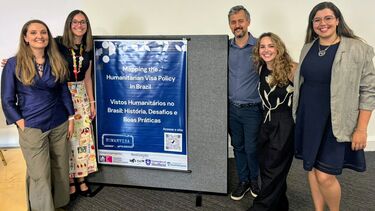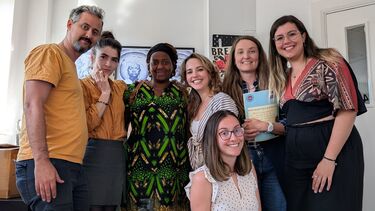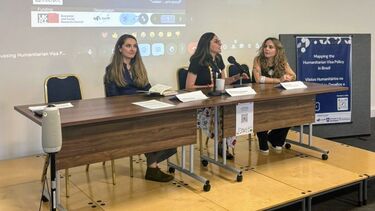From 6 to 15 May 2025, the Brazilian team of the conducted a working visit to the University of şů«Ӱҵ. The project is a collaborative effort between researchers from the Federal University of SĂŁo Carlos (UFSCar), the University of şů«Ӱҵ, and the University of Southampton, with funding from the of the Economic and Social Research Council of the United Kingdom (ESRC/UKRI).
During the visit, the research team held three internal workshops with core members of the project: Dr PatrĂcia Nabuco Martuscelli (University of şů«Ӱҵ, co-director of the MRG), Dr Natália Cintra (University of Southampton), and Dr Svetlana Ruseishvili (Federal University of SĂŁo Carlos, Brazil), alongside research assistants Rafael Faustino Oliveira and Ana Maria Gomes Augusti (both from UFSCar). These sessions were key to refining the conceptual framework for humanitarian visas and advancing the drafting of the final report.
The team also visited two organisations supporting forcibly displaced individuals: and the in Leeds. These meetings provided valuable perspectives on grassroots responses to displacement and the UK’s migration context.
A highlight of the visit was the forum “Discussing Humanitarian Visa Policies: Global Perspectives, Solutions and Challenges”, organised by the research team on 13 May in şů«Ӱҵ. The event featured three roundtable discussions:
- Rethinking Humanitarian Visas in Comparative Perspective
This session explored critical approaches to safe and legal routes. Professor Michaela Benson (University of Lancaster) analysed UK policy as a mechanism of domestic control, shaping who is received and integrated, and stressed how ad hoc reception frameworks contribute to the stratification of migrants’ rights and entitlements. Dr Lucy Mayblin (University of şů«Ӱҵ) questioned whether safe and legal routes effectively address irregular Channel crossings, highlighting the tension between their protective potential and discretionary application. Ellen Swan (Pathways International) presented the Named Sponsorship Global Programme, detailing its progress in countries such as Brazil.
- Mapping Humanitarian Visa Policy in Brazil
The HumanVisa team shared preliminary research findings, emphasising the complex legal and institutional framework surrounding humanitarian visas in Brazil. The discussion addressed the historical layers of visa implementation and their selective nature, as well as challenges ahead in shaping evidence-based policy recommendations.
- Challenges and Solutions for Humanitarian Visas in the UK
This panel brought together organisations working directly with migrants and refugees in the UK and valued the voices of people with lived experience. Fathima Jehnnara Mohideen (City of Sanctuary şů«Ӱҵ) argued that current safe and legal routes are insufficient and largely inaccessible, contributing to increased irregular arrivals. Dr Peninah Wangari (Racial Justice Network) reflected on the limitations of complementary pathways in advancing racial justice. Dan Webb (Refugee Education UK) highlighted the vital role of universities in offering alternative protection routes through education. Dr Nooralhaq Nasimi (Afghanistan and Central Asian Association) shared insights from years of work with Afghan refugees, emphasising the challenges of long-term integration in the UK.
The forum successfully brought together researchers, practitioners, and activists to reflect on humanitarian visa policies from comparative perspectives and to share early findings from the Brazilian fieldwork. The event fostered critical discussion on the role of visa mechanisms in protecting displaced populations and highlighted both convergences and contrasts between the UK and Brazil.
You can find more information about the Mapping Humanitarian Visas project in our webpage:
This blog post was co-written by Dr Patricia Nabuco Martuscelli (University of şů«Ӱҵ), Dr Svetlana Ruseishvili (Federal University of SĂŁo Carlos, Brazil), and Dr Natália Cintra (University of Southampton)



